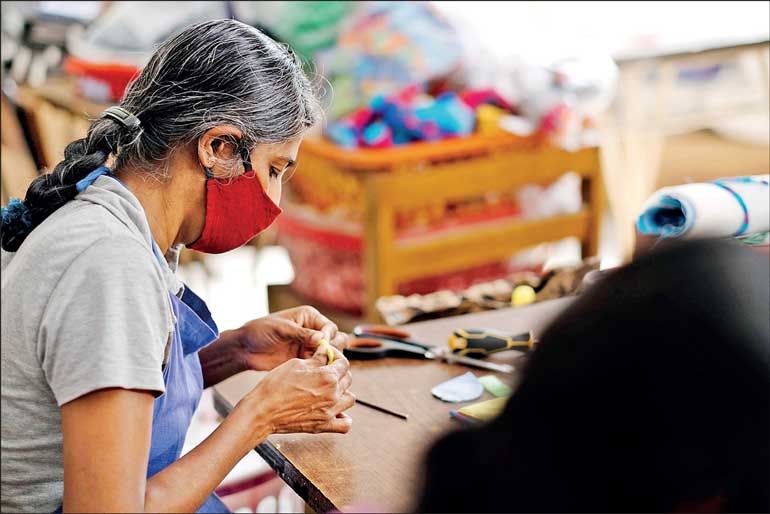Sunday Feb 15, 2026
Sunday Feb 15, 2026
Saturday, 4 March 2023 00:10 - - {{hitsCtrl.values.hits}}

The contribution of small entrepreneurs to the economy and the growth of the economy cannot be ignored
 “I firmly believe that unless one has tasted the bitter pill of failure, one cannot aspire enough for success”
“I firmly believe that unless one has tasted the bitter pill of failure, one cannot aspire enough for success”
– A.P.J. Abdul Kalam
We, as Sri Lankans are now experiencing the worst economic crisis since our independence in 1948. Everybody in the country feels the cost of living in terms of indicators such as taxation, electricity bills, etc. As per records of the World Food Program, almost 70% of Sri Lankan households are reducing meal sizes. All of us expect an extended fund facility of $ 2.9 billion from the IMF and in order to obtain that there are many conditions to be fulfilled despite social unrest. Anyway in this given context we need to swallow this bitter pill. But what is next is the million-dollar question.
Move forward
This is the 17th time we are going for the IMF rescue program. Sri Lanka never learned lessons from past experiences. There is a need for policymakers to study this and have a proper analysis of the loans taken by Sri Lanka for the last five decades (As an example: foreign debt –multilateral, bilateral and market borrowings) and outcome. This study would give experts about the so-called “debt trap” and its implications for the future. There should be proper Key Performance Indicators (KPIs) for loans taken and for the utilisation of same. Sri Lanka needs to learn lessons from the past by analysing numbers. It can be recommended to have a separate independent body comprising experts in Economics, Business Management, Accounting and Finance to make decisions on taking loans and utilisation aligning with a sustainable competitive advantage. Anyway, it is worth noting that having loans with a dependent mentality is not driving any country for the future.
Role of citizens
I have seen young Sri Lankans engaging in some effective business activities in terms of e-commerce, exporting and farming. There should be a “paradigm shift” in Sri Lanka in education for long-term survival. Universities should produce Entrepreneurs, not Employees. Furthermore Abeng and Obinnaya (2017) clearly indicated that the “Entrepreneurship education is a lifelong process, starting as early as elementary school and progressing through all levels of education including adult education, focusing on developing understanding and capacity for pursuit of entrepreneurial behaviours, skills and attributes in widely different contexts”. Hence we need to understand the importance of the SME sector for any country.
Small and Medium entrepreneurs play a huge role in the development of any country and the contribution of small entrepreneurs to the economy and the growth of the economy cannot be ignored. For example, in the United States, about 70% of new job creation is done by small businesses and it should be noted that small businesses in that country contribute 13 times as many patents to the world than other businesses. This is the same in Sri Lanka as well. The SME sector in Sri Lanka is contributing to 45% of total employment and 52% of the gross domestic product of the country. In this context, it is important to discuss the concept of “Avocation” which is defined as “a hobby or any other activity taken up in addition to one’s regular work; it may especially refer to something that is a person’s “true” passion or interest”. At the moment we can witness many young people in Sri Lanka involving in activities with their true passion.
Dulanjana Vithanage, a product of the Department of Marketing Management, University of Sri Jayewardenepura is involved in promoting jackfruit in Sri Lanka [The jack tree is sometimes called “bath gaha” (rice tree) by the Sinhalese]. As an entrepreneur, Dulanjana has made varieties of products including Kosposha and Jackfruit noodles. A young man, passionate about the natural environment coming from a beautiful village called Thuwakkudahena (in Galle district) can be considered as one of the success stories. Sri Lankan universities should create entrepreneurs like Dulanjana and not mere employees. Hence there is a need for some radical changes in the education policy of the country to have a “citizen who loves and respects to Tradition, Environment and People (TEP) while enhancing knowledge in IT and other Soft Skills (SS).
Conclusion
We need to learn lessons from the past and need to have a proper analysis of the performance with prudent decision-making. Sri Lanka does not have a future if we do not motivate entrepreneurs. And all religious places need to have a separate section of mentoring for young people who are involved in the business. Hence there is a prerequisite for all of us to understand the situation and provide the best for the country.
“Ask not what your country can do for you, ask what you can do for your country.” – John F. Kennedy’s Inaugural Address, January 20, 1961.
(The writer is a Professor in Management Studies, Open University of Sri Lanka and you can reach him via [email protected].)